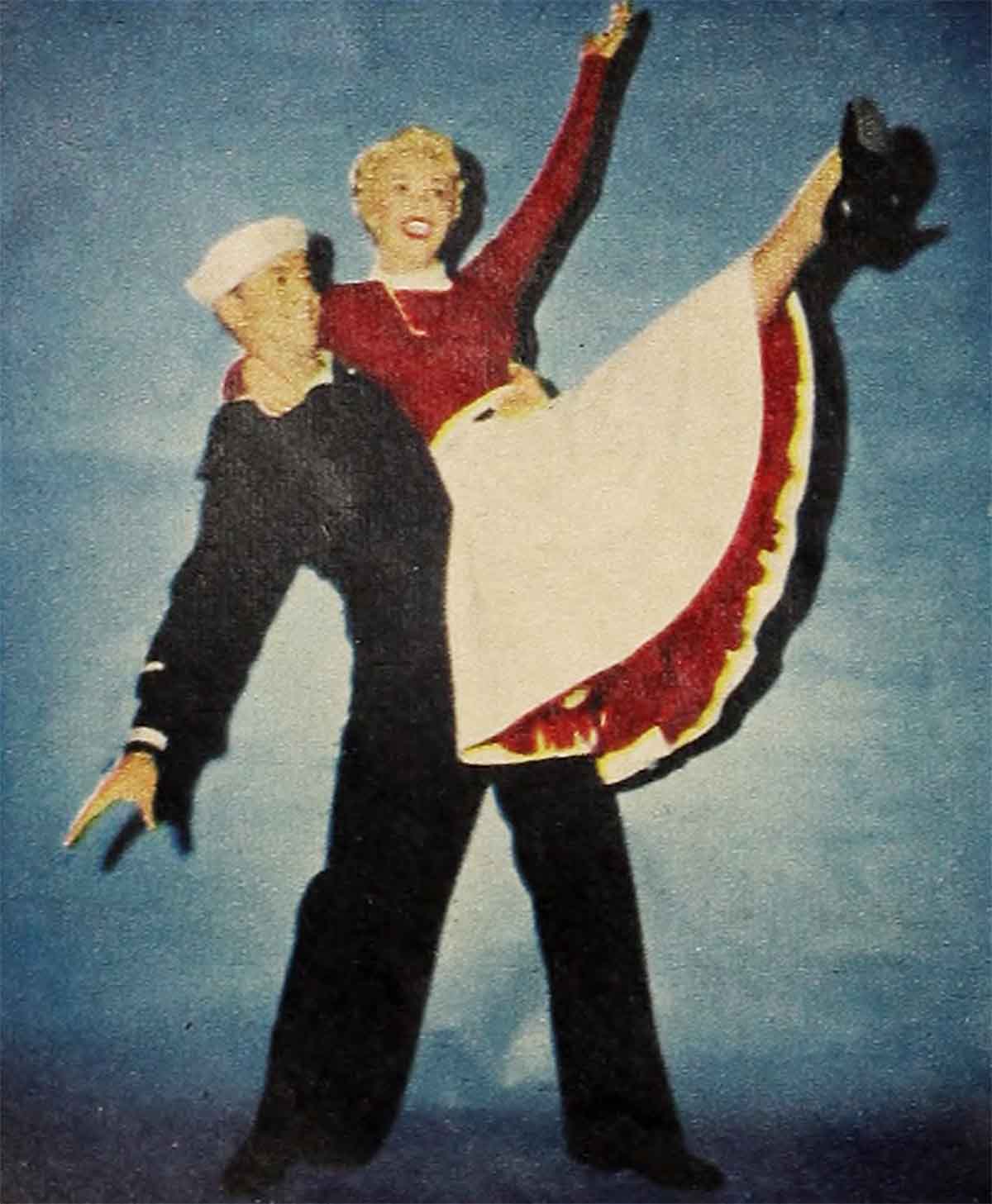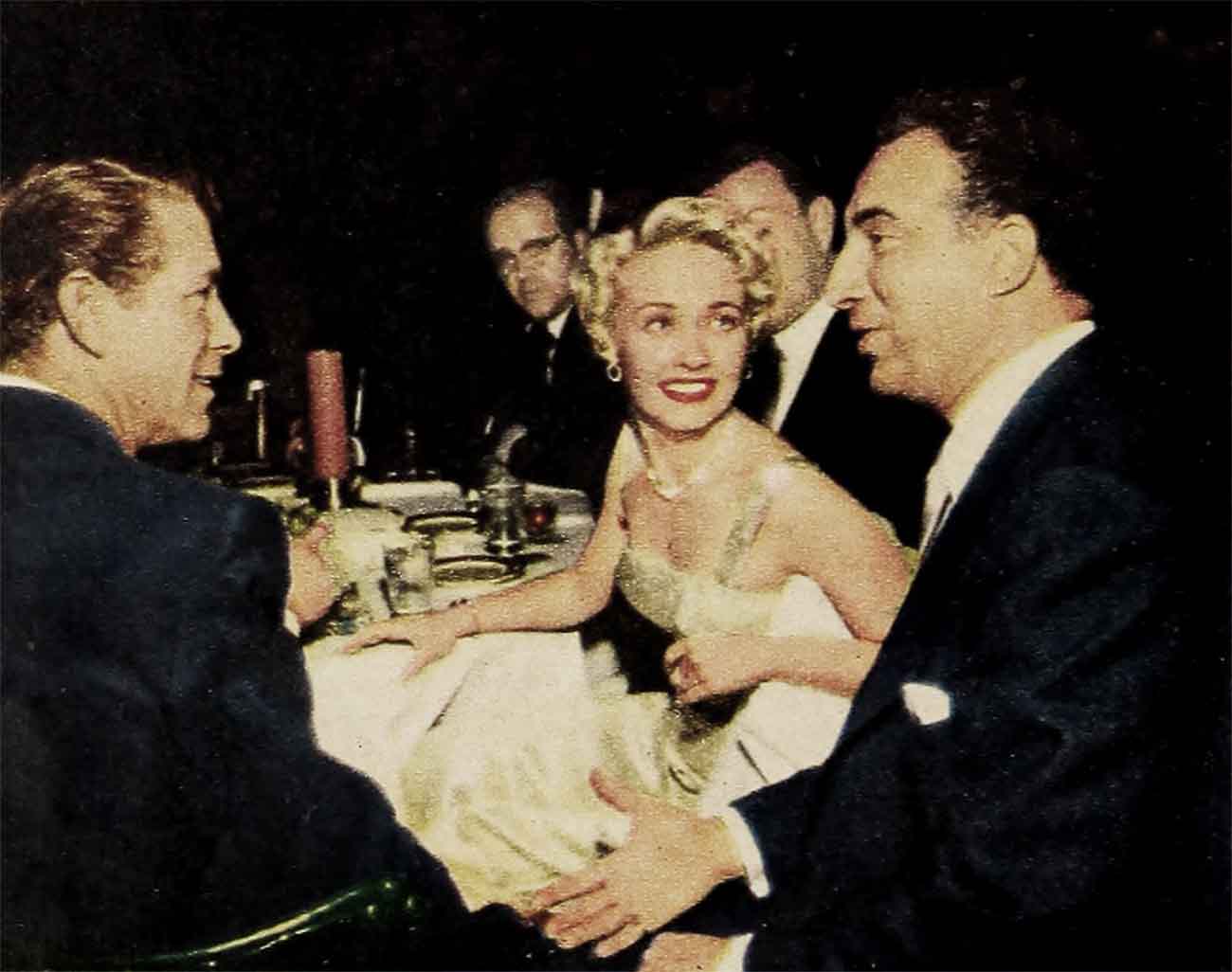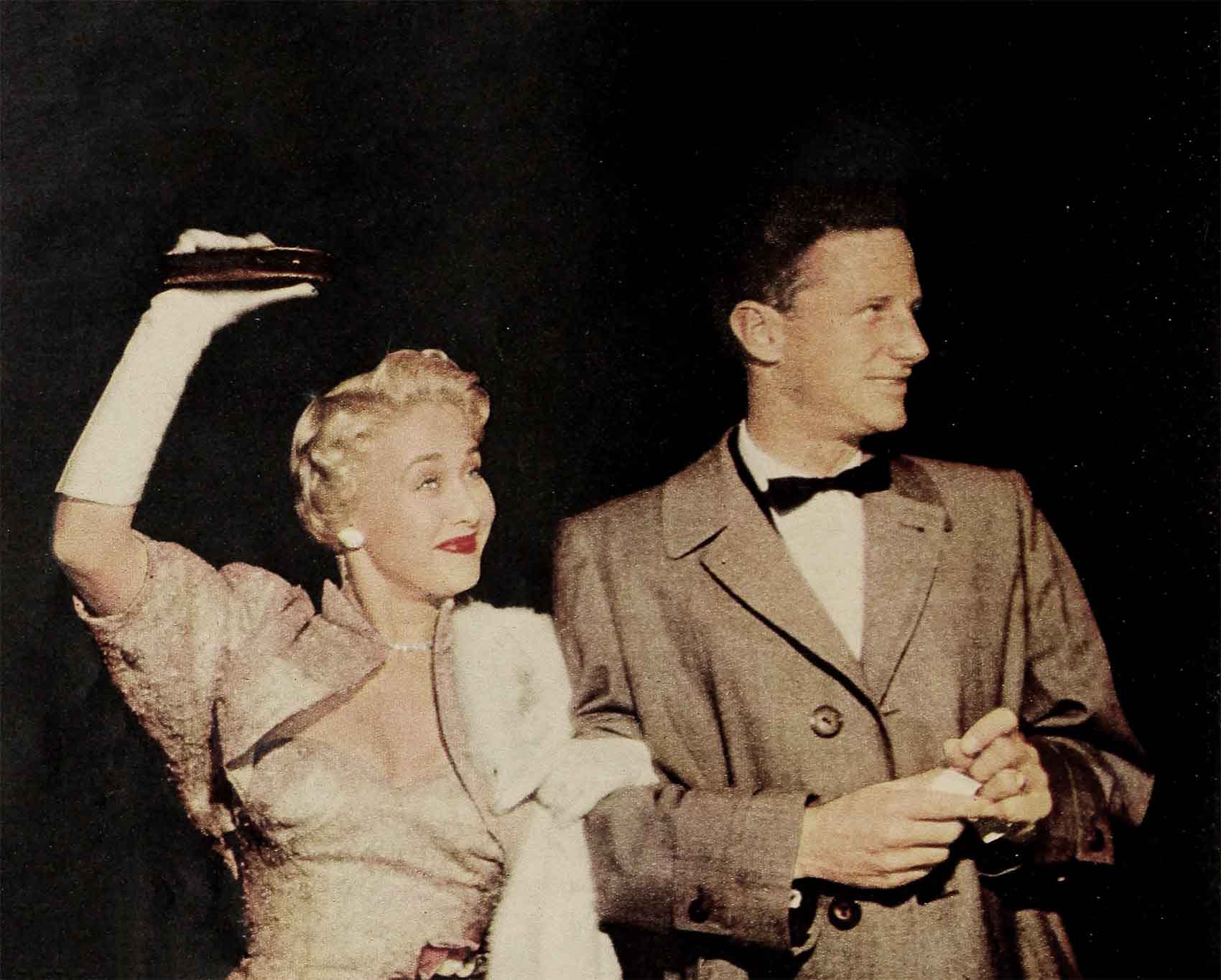
Dangerous Crossroad—Jane Powell & Geary Steffen
“Our marriage will succeed. I know the tragedy of separation, because I’ve seen it with my own parents; I know, too, what it has done to the lives of some of my friends. And, if it were necessary, I’d give up my career to save my marriage.”
Jane Powell said that with deep conviction. She said it, not just a few days ago, but shortly after her marriage to Geary Steffen began, in November of 1949. At that time, by the wildest stretch of the imagination, she couldn’t possibly have conceived that she would have occasion to recall those earnest words, some four years later. But now she knows, as does Geary, of the tremendous pressures which can well up against an apparently impregnable union. With one voice they exclaim, “Why can’t we be left alone to settle our personal problems?”
It is a harsh contradiction to, face, this discovery that Hollywood reporters, who constantly hailed their marriage as “perfect,” should now after one brief quarrel be so apparently convinced that these two are headed directly for the divorce court. Yet Jane Powell should hardly find it in her heart to blame her reporter friends, for they were not the first to break the news. Hollywood’s 300 news correspondents, reading the abrupt announcement from her studio that she and Geary had “tiffed” and “hoped” to work things out, were both shocked and surprised.
Jane, never having been through a situation like this before, was only trying to be her honest self. Unfortunately, however, it was not possible for the press to accept this somewhat questionably worded statement and then sit back calmly to wait for another “handout” that never came. As matters stood, editors across the country immediately clamored for followup news. Jane and Geary had agreed between themselves not to discuss the matter, which everyone admitted was their privilege. They kept that promise to each other, but where was the second bulletin stating that they had not really separated? Clearly, someone in the press department had “goofed,” for the only alternative now was for reporters to go out and play detective on their own.
The results were both comic and grim. One columnist fairly stated that the entire affair had blown over, at least temporarily. Another stated, without foundation in fact, that Geary had moved away from home to an apartment of his own. Into print went the statement in one paper that Geary was “jealous,” and in another, datelined from Palm Springs where Geary had taken Jane for a rest, a pointed anonymous item hinting that the young husband of a certain well-loved dancing and singing star was courting disaster with his outside romantic interests. The topper was the prediction that Jane’s personal appearance for two weeks at the Desert Inn in Las Vegas was for the express purpose of establishing residence in Nevada in order to obtain the so-called painless six-week divorce treatment.

Most of this news was pure conjecture, for Jane and Geary had at least temporarily made up their private differences. Then, reluctantly, Hedda Hopper reported in her column, “Jane Powell’s separation from her husband Geary Steffen shocked me profoundly. I don’t believe she’ll wait long before getting a divorce. Since she has a night club engagement in Las Vegas I wouldn’t be surprised if she stayed there the required six weeks and got her divorce. The guy she fell head over heels for is dancer Gene Nelson, who recently separated from his wife and is the father of a small child.”
All Hollywood, including Hedda, hopes that this will not be the case, and in fact the press on first noting the obvious interest between Jane and Gene “sat on” the gossip. They hoped that this would be just another case in which the leading man and his leading lady became infatuated with each other during the production of a picture. It happens frequently, as it apparently did with Jane and Gene on the set of Three Sailors And A Girl. But in most instances, a week or so after the picture is over the temporary unreal romantic atmosphere in front of the camera dies away and everything is forgotten. Sometimes, however, emotions get out of hand, rumors blossom and become fact. Then unless all parties are willing to forgive and forget, divorce becomes inevitable.
Boiled down, all the stories, comments, and rumors come to this factual status of the Powell-Steffen situation: Usually the husband is the last to know in a marital situation of this sort, but unlike other pending divorces, Jane and Geary have remained under the same roof. Up to a day before she left for her personal appearance tours in the east and in Canada, Jane and Geary were together in their Brentwood house, and there had been no physical separation. They both admitted there was serious trouble, but that they had arrived at a definite plan. Jane was to go to Toronto, then to New York, and on to Las Vegas for her two weeks there beginning May 12th. During that time they would consider themselves in a trial separation period.

Columnists, hearing this schedule, insisted that this was the end. They pointed to the fact that Gene Nelson would be in New York at the same time with her.
Jane said nothing. She was incommunicado. But intimates insisted that even then Jane and Geary were earnestly trying to hold their marriage together. They were married in the Catholic church. Jane did not become a Catholic, but took instruction in Geary’s faith, and respects his religion. Both of their children were baptized in the Catholic church.
Those who saw Geary Steffen, just before Jane’s departure, on his knees, drawn and haggard, earnestly praying, knew the reason. What they did not know was that Jane was also on her knees, praying equally as fervently in another church. They both asked the same grace—to be given strength in the difficult weeks ahead, and wisdom in making their decision.
Let’s see how this situation has affected Jane Powell. The truth is that Jane and Geary have long had a thorough understanding on the subject of leading men. She’s worked with dozens of them, lunched with them, had them call her “honey,” a favorite form of show business salutation; she’s listened to their romantic woes, smilingly shrugged off their meaningless and habitual passes. In this case, after the picture was over, Gene Nelson happened to be present at Ciro’s the night Geary tossed a birthday party for Jane. She danced with a half-dozen men that night. Certainly, if there had been cause to take serious objection to any male behavior, Geary could have handled it. The son of the great fighter, Willie Ritchie, Geary is a rugged boy himself. No one wants to irk him unduly in his presence or behind his back.

No, whatever the rumored “evidence” concerning the cause of their disagreement, the underlying cause which Jane and Geary decided not to discuss was much more complex than any real or imagined flirtation.
Jane is such a trouper that no one thought to inquire into the state of her health. So, we come to facts. Her second baby was born on November 21st, last year. Being used to rigorous picture schedules, she didn’t think that January 15th was too soon to begin work in Three Sailors And A Girl. Unfortunately, the schedule for this film was tightened considerably, due to Warners’ decision to close down for a short period. Dance numbers which normally would have been done in two or three days were ordered completed in one. So close was Jane to complete physical exhaustion that she fainted dead away during one number. This, however, didn’t prevent her from working the whole day the following Sunday, nor from carrying on other overtime work even though suffering from the flu.
It’s no secret that having a baby frequently has a severe effect on any woman’s power of endurance; frequently a considerable change for a time on her mental outlook. Jane badly needed a rest, but couldn’t have one. As a matter of fact her closest friends maintain that if she hadn’t gone back to work so soon after the last baby this might never have happened. This is not to say that she became completely unreasonable and ill-tempered, therefore being the one to blame. Privately, both have admitted to close friends that they each feel responsible for their differences of opinion. By so doing they display the necessary concern for each other that is required to help them through this difficult period in their marriage.

Incredibly, it is a Hollywood habit to read a headline and accept it immediately as irrevocable truth. For this reason, a large portion of the movie colony, preoccupied with their own lives, assumed that Jane and Geary actually had separated from the moment the studio took official recognition of their spat. Very few people noticed that two days later Jane appeared at the airport late at night with Geary to keep an important date—the arrival of the unique three-wheeled English car. The Regal, in which they have an interest, together with Barron Hilton and Quay Sargeant. Jane stood around for nearly an hour in the chilly night air, waiting for the Slick Airways plane to bring the car in. Then she posed with the remarkable machine for publicity photos needed in connection with its impressive premiere showing at the annual Los Angeles Sportsman’s Show. If she and Geary were losing their mutual interests, Jane most certainly would have begged off.
The Regal, which travels at speeds up to 70 miles an hour, doing 50 miles to a gallon of gas and selling for just over $1,000, is but one of Geary’s carefully planned interests of which Jane has reason to be proud. Not everyone remembers that when they first became engaged it was Geary who held back from an early marriage. He realized that there might not be a long-range future in his job at the time as Sonja Henie’s skating partner. Strictly un-Hollywood in his thinking, he was determined to enter a profession in which he could support his wife and future family, even if she were to never again set foot on a studio lot. So Geary prepared himself carefully in the insurance business.
In the months and years that have followed, Geary has established himself as one of the most-liked business men in Los Angeles. True, his daily associates are people who can never catch the headwaiter’s eye at Mocambo. Yet, because he has constantly helped “ordinary guys” to build up their estates, he is a solid man in his community. For proof of this, ask around a little about Mr. Steffen.
As one example, consider what the operator of a small machine repair shop has to say: “It took Geary six months to convince me that my insurance program was inadequate. Without the protection he sold me, my trip to the hospital would have set me back $1,000. Not only did he save me a lot of money; he sent me a bunch of new customers. I’ve never met his wife, but when I do I want to tell her what she already knows: ‘In my book, your husband is one swell guy!’ ”
Jane indeed does know this and usually talks more about him than she does about herself. Her feelings, past and present, are best defined by her good friend, Betty Lynn, who not long ago told a MODERN SCREEN reporter, “Jane is so intelligent about life. She’s so sure of what she wants. She has never fallen in and out of love like a lot of other young kids. She knew she’d fall in love with the right man when he came along. And she did. She knew it was Geary, and no one else, because he represented all the fine things that Jane wanted in a husband. He was charming, intelligent and hard working. Having worked so hard herself, she expected no less in her ideal.”
Moreover, what Geary Steffen has done for others, he has also accomplished for his own family. If something happened to him, suddenly, they’d be more than adequately provided for if Jane never worked another day in her life. In addition, he and Jane only last year completed the building of a ten-unit apartment house in the San Fernando valley. Next door to this building, they own a couple of additional lots on which they will erect other apartment units, “when they have the money.”
Because they have avoided the shallow Hollywood social life in favor of building mutual interests together, it would be no easy decision to dissolve their marriage. They have both seen close friends who have given up the complex problem of maintaining complete marital harmony. One of these said, on reading the news about them, “I hope that Jane and Geary have the sense to hold on tight to what they have, for the sake of themselves as much as for their children. I didn’t, and I have regretted it ever since.”
That these two will and are trying to is obvious, for they are very aware that in this modern age three out of every four marriages are failing throughout the nation, with an even higher percentage in Hollywood. One night, before they were wed, Geary asked Jane, “What do you think ruins most marriages around town?”
They agreed that there are four major causes: career trouble, financial trouble, in-law trouble and the problem of fading love. At that time they took inventory of themselves and believed that they would be able to survive these major obstacles. Today, they have only two hurdles which they conceivably may fail to jump—career trouble and fading love.
The career trouble Jane knows very well. Knows, too that it is something every actress must fight against. Currently there are stories that Jane’s new Metro contract was partially dependent on the promise that she wouldn’t have another child for three years. The truth is that no such clause can be put in a contract, legally, although it might be “understood.” Another factor, blown up out of all proportion, perhaps even in Janie’s mind, is the studio’s decision to concentrate on glamorizing all of its feminine stars. Most of them now regretfully tell their friends in the press that they cannot pose for pictures with their children; it is against studio “policy.”
As for Jane, the policy is an unfortunate complete reversal. Of course, until very recently she was limited to homey little girl parts. This, however, can be blamed more on the short sightedness of certain producers than on a healthy public interest in her private life happiness. Under the circumstances, with sophisticated and dramatic parts going to other girls on the lot, a less balanced girl than Jane would have decided that the only thing to do to convince producers that she could play something besides gingham roles would be to “do a Lana Turner on the night club rail.” Instead, Jane has never sought to “showcase” herself and has turned a blithe but cold shoulder toward romantic intrigue in private life.
And to what end? ‘Today she commands tremendous money on personal appearances. It appears certain that she will take over the top feminine role in The Student Prince. But if Fate should cost her that role, one of the most important of the year—would she lose it to a glamor girl? No, the most likely star to play it would be Ann Blyth, a close friend of Jane’s and a girl who has always been far from the “glamor type.”
If there is anything wrong with Jane’s career, it might readily be the advice of “career experts” who would give her a false veneer. Taken out of context, Jane’s statement in a recent interview, to the effect that, “I’ve had a little secret ambition to play a bubble or fan dancer or burlesque queen . . . there’s something earthy and vital about girls who do these things . . .” sounds a little like a publicity man’s idea. Certainly, if the burlesque queen or fan dancer were asked if she’d change places with Jane Powell, “nice girl” roles and all, she’d doubtless give an earthy answer— “Yeah girl!”
To be serious again, as matters stood at last report, Jane and Geary had moved into their two story white colonial mansion on Sunset Boulevard, set far enough back from the street so that the heavy traffic is a mere hum. Matter of fact, they moved into the place while the gossip about them was the heaviest and friends were speculating about their nightly whereabouts. Instead of being separately “out on the town,” they were moving in bits of furniture and personal belongings they didn’t want to trust to the storage vans.
Instead of buying a whole house full of new furniture, they are installing the old pieces, planning to purchase new traditional furniture as they go along. So interested has Jane been in her new home that when Geary asked what she wanted for her birthday she made him promise to buy only things they could use in the new house—nothing for herself.
There is an air of permanency about this lovely mansion, purchased through their mutual efforts and with the profits from the sale of the home in which they have lived for four years. Almost twice as large as the old place, there are two bedrooms for Geary, Jr., and baby Suzanne, who need their own quarters. There’s an extra bedroom too for another possible addition to the family.
Even now, Jane is reported to have cancelled plans for arranging a property settlement and cut short her tour to meet Geary in Las Vegas.
These facts should stand up well against the opinion of skeptics who insist that once there is the slightest break in a marriage, there is no going back; sooner or later the final parting will come. Even so, a veteran observer is greatly tempted perhaps by wishful thinking that if Jane and Geary can get a solid grip on themselves and each other they can go right on with the job of solidifying their marriage.
In fact, he may even mark it down as a certainty as he chooses to believe in what Jane herself has said, to wit: “You’ve got to make an effort to be happy. You can’t just think that you’re something special and entitled to it. I have my career; Geary has his work. But we have something more important together. Something we both share—our home and our family. That’s what makes a good marriage something to share. If that goes, then I think that love goes, too.”
Jane Powell said that in 1951. Now, in 1953 . . .?
THE END
—BY LOUSUILO ANDERSON
It is a quote. MODERN SCREEN MAGAZINE JULY 1953




